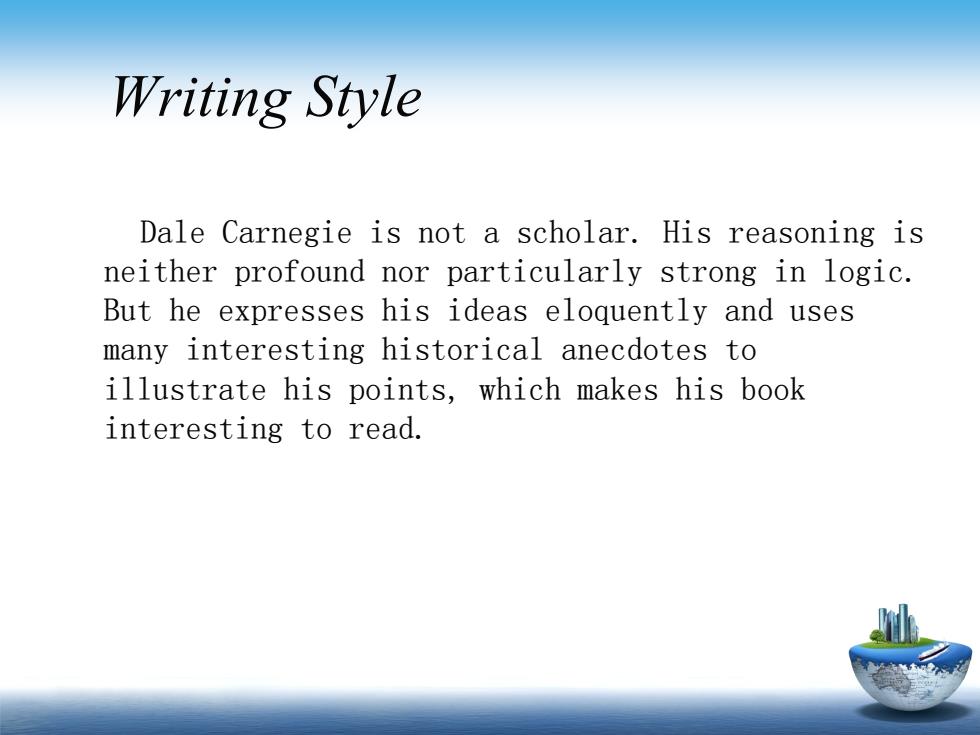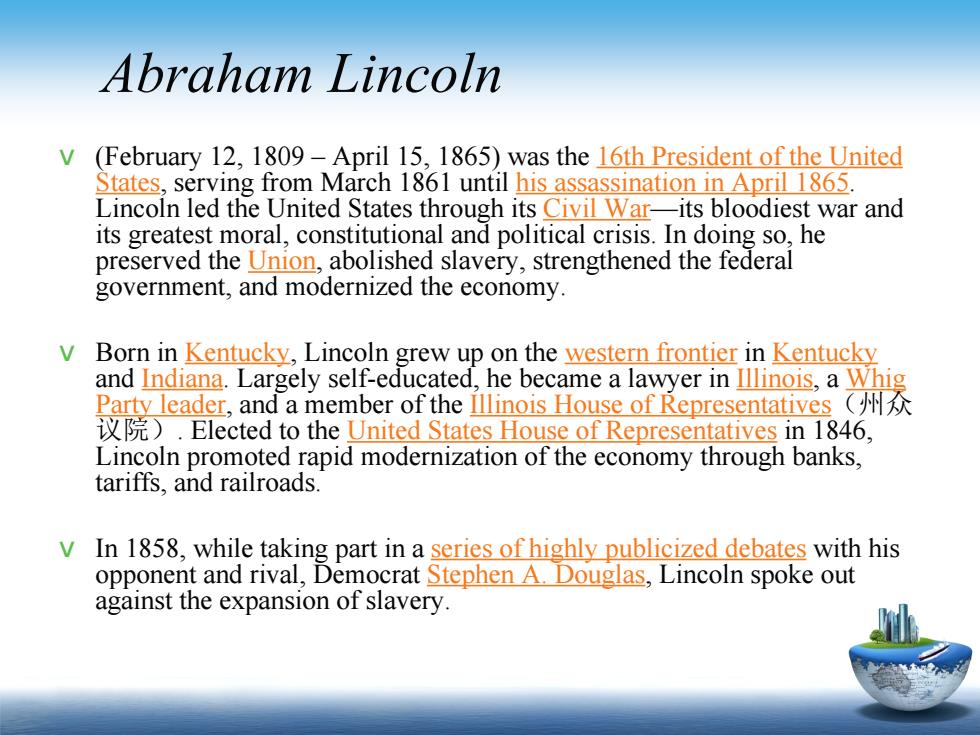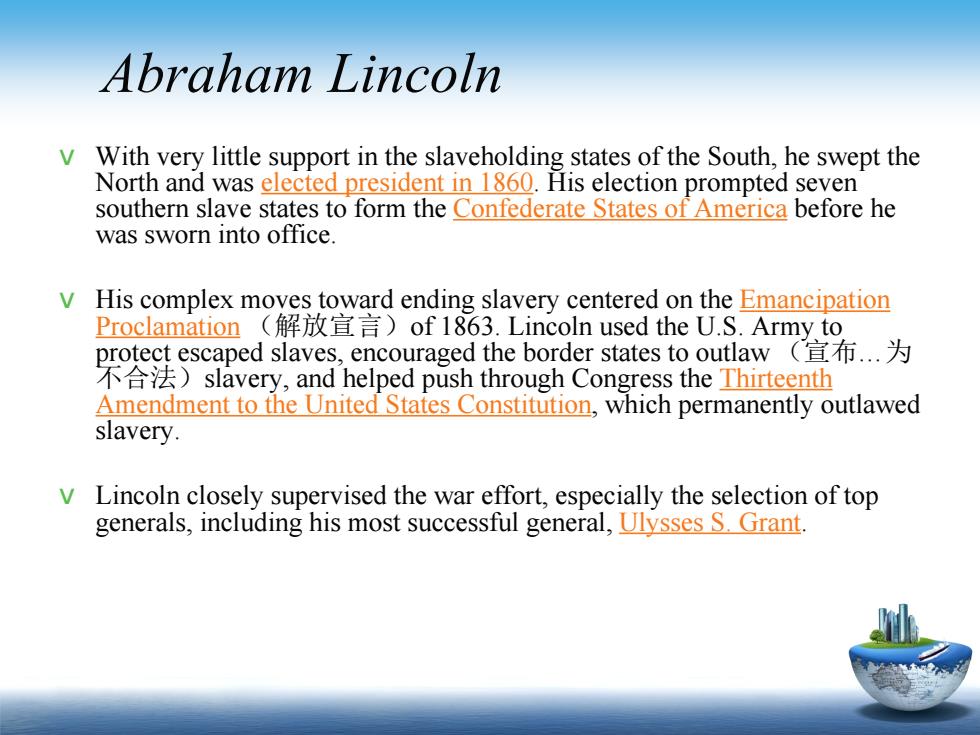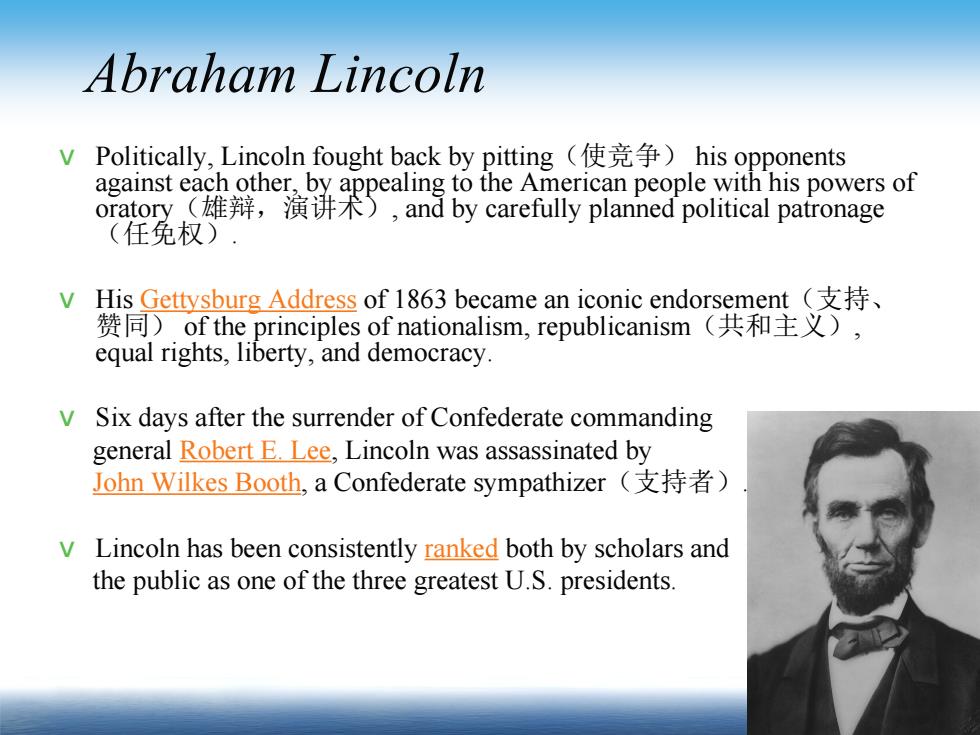
Writing Style Dale Carnegie is not a scholar.His reasoning is neither profound nor particularly strong in logic. But he expresses his ideas eloquently and uses many interesting historical anecdotes to illustrate his points,which makes his book interesting to read
Writing Style Dale Carnegie is not a scholar. His reasoning is neither profound nor particularly strong in logic. But he expresses his ideas eloquently and uses many interesting historical anecdotes to illustrate his points, which makes his book interesting to read

Abraham Lincoln (February 12,1809-April 15,1865)was the 16th President of the United States,serving from March 1861 until his assassination in April 1865 Lincoln led the United States through its Civil War-its bloodiest war and its greatest moral,constitutional and political crisis.In doing so,he preserved the Union,abolished slavery,strengthened the federal government,and modernized the economy. V Born in Kentucky,Lincoln grew up on the western frontier in Kentucky and Indiana.Largely self-educated,he became a lawyer in Illinois,a Whig Party leader,and a member of the Illinois House of Representatives )Elected to the United States House of Representatives in 1846. Lincoln promoted rapid modernization of the economy through banks, tariffs,and railroads. V In 1858,while taking part in a series of highly publicized debates with his opponent and rival,Democrat Stephen A.Douglas,Lincoln spoke out against the expansion of slavery
Abraham Lincoln v (February 12, 1809 – April 15, 1865) was the 16th President of the United States, serving from March 1861 until his assassination in April 1865. Lincoln led the United States through its Civil War—its bloodiest war and its greatest moral, constitutional and political crisis. In doing so, he preserved the Union, abolished slavery, strengthened the federal government, and modernized the economy. v Born in Kentucky, Lincoln grew up on the western frontier in Kentucky and Indiana. Largely self-educated, he became a lawyer in Illinois, a Whig Party leader, and a member of the Illinois House of Representatives(州众 议院). Elected to the United States House of Representatives in 1846, Lincoln promoted rapid modernization of the economy through banks, tariffs, and railroads. v In 1858, while taking part in a series of highly publicized debates with his opponent and rival, Democrat Stephen A. Douglas, Lincoln spoke out against the expansion of slavery

Abraham Lincoln v With very little support in the slaveholding states of the South,he swept the North and was elected president in 1860.His election prompted seven southern slave states to form the Confederate States of America before he was sworn into office. V His complex moves toward ending slavery centered on the Emancipation Proclamation(解放宣言)of1863.Lincoln used the U.S.Army,to protect escaped slaves,encouraged the border states to outlaw (. 不合法)slavery,.and helped push through Congress the Thirteenth Amendment to the United States Constitution,which permanently outlawed slavery. V Lincoln closely supervised the war effort,especially the selection of top generals,including his most successful general,Ulysses S.Grant
Abraham Lincoln v With very little support in the slaveholding states of the South, he swept the North and was elected president in 1860. His election prompted seven southern slave states to form the Confederate States of America before he was sworn into office. v His complex moves toward ending slavery centered on the Emancipation Proclamation (解放宣言)of 1863. Lincoln used the U.S. Army to protect escaped slaves, encouraged the border states to outlaw (宣布.为 不合法)slavery, and helped push through Congress the Thirteenth Amendment to the United States Constitution, which permanently outlawed slavery. v Lincoln closely supervised the war effort, especially the selection of top generals, including his most successful general, Ulysses S. Grant

Abraham Lincoln V Politically,Lincoln fought back by pitting(使竞争)his opponents against each other,by appealing to the American people with his powers of oratory(雄辩,演讲术),and by carefully planned political patronage (任免权). V His Gettysburg Address of 1:863 became an iconic endorsement(支持、 赞同)of the principles of nationalism,republicanism(共和主义), equal rights,liberty,and democracy. v Six days after the surrender of Confederate commanding general Robert E.Lee,Lincoln was assassinated by John Wilkes Booth,a Confederate sympathizer(支持者) V Lincoln has been consistently ranked both by scholars and the public as one of the three greatest U.S.presidents
Abraham Lincoln v Politically, Lincoln fought back by pitting(使竞争) his opponents against each other, by appealing to the American people with his powers of oratory(雄辩,演讲术), and by carefully planned political patronage (任免权). v His Gettysburg Address of 1863 became an iconic endorsement(支持、 赞同) of the principles of nationalism, republicanism(共和主义), equal rights, liberty, and democracy. v Six days after the surrender of Confederate commanding general Robert E. Lee, Lincoln was assassinated by John Wilkes Booth, a Confederate sympathizer(支持者). v Lincoln has been consistently ranked both by scholars and the public as one of the three greatest U.S. presidents

Benjamin Franklin V (January 17,1706-April 17,1790)was one of the Founding Fathers of the United States. v A renowned polymath(博学家),Franklin was a leading author,printer,political theorist,politician,postmaster,scientist, inventor,civic activist,statesman,and diplomat v As a scientist,he was a major figure in the American Enlightenment 蒙运动)and the history of physics for his discoveries and theories regarding electricity Benjamin Franklin Writer lmventor Statesman V As an inventor,he is known for the lightning rod,bifocals(双光眼镜), and the Franklin stove,among other inventions. V He facilitated many civic organizations, including Philadelphia's fire department and a university
Benjamin Franklin v (January 17, 1706 – April 17, 1790) was one of the Founding Fathers of the United States. v A renowned polymath(博学家), Franklin was a leading author, printer, political theorist, politician, postmaster, scientist, inventor, civic activist, statesman, and diplomat. v As a scientist, he was a major figure in the American Enlightenment (启 蒙运动)and the history of physics for his discoveries and theories regarding electricity. v As an inventor, he is known for the lightning rod, bifocals(双光眼镜), and the Franklin stove, among other inventions. v He facilitated many civic organizations, including Philadelphia's fire department and a university